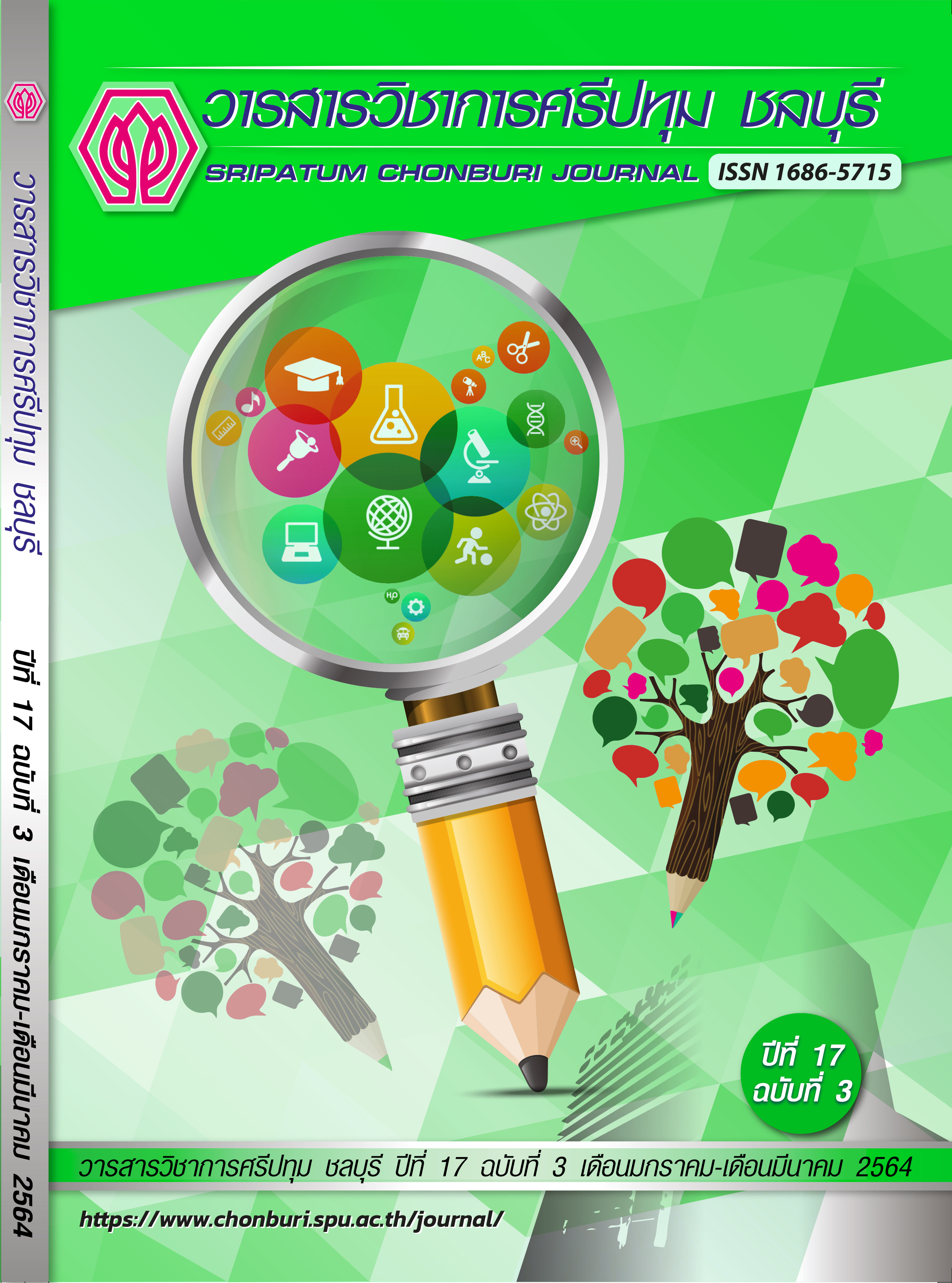NEW NORMAL LIFESTYLE WITH SOCIAL RESPONSIBILITY STRATEGY OF HOTEL BUSINESS
Keywords:
corporate social responsibility (CSR), hotel business, strategy, new normal lifestyleAbstract
This article aims to present a strategy guideline of social responsibility of the modern hotel business under the new normal lifestyle. The study found that promoting social activities in accordance with the organization's policy under the principles of social distancing, focusing on wearing a mask during the activities as well as avoiding unnecessary touch and always washing hand with soap or alcohol. The development of the organization's operations in order to achieve continuous economic growth of the organization for sustainability by switching to more online transactions to reduce confrontation and contact. In addition, strengthening the society focusing on paying attention to the quality of life of employees and raising awareness of community and society development and improve some of work to be online (work from home). It is focusing on reducing contact with people and things at various locations, including support and development of online learning (e-Learning) for children in community to reduce the integration of children. Therefore, it allows children to be able to study anywhere, anytime, so children do not lose the opportunity to study. More than that, focusing on activities related to preserving nature and the environment under the principle of social distancing, focusing on wearing a mask throughout the activities, in which every activity must have a screening point as a checkpoint for participants before every activity. Also, focusing on equitable participation of all stakeholders through screening and social requirements, but if participants are at risk of being infected or coming from surveillance area that it is necessary to use quarantine to ensure that all participants of the social activities are safe from serious pandemics.
References
กระทรวงการอุดมศึกษา วิทยาศาสตร์ วิจัยและนวัตกรรม. (2563). New Normal ชีวิตวิถีใหม่ และการปรับตัวในภาวะ COVID-19 (ออนไลน์). เข้าถึงได้จาก: https://www.mhesi.go.th/home/index.php/pr/all-media/55-covid-19/covid-km/1448-new-normal [2563, 21 กรกฎาคม].
กองทุนการออมแห่งชาติ. (2563). New Normal ความปกติในวิถีชีวิตใหม่ (ออนไลน์). เข้าถึงได้จาก: https://www.nsf.or.th/images/nsf/pr/news/contents/2563/256305/05/25630520-01.pdf [2563, 19 กรกฎาคม].
กองยุทธศาสตร์และแผนงาน กรมส่งเสริมอุตสาหกรรม. (2563). New Normal กับวิถีชีวิตที่เปลี่ยนแปลง (ออนไลน์). เข้าถึงได้จาก: https://dsp.dip.go.th/th/category/2017-11-27-08-04-02/2020-06-29-14-39-49 [2563, 21 กรกฎาคม].
เครือเจริญโภคภัณฑ์. (2563). โควิด-19 กับพฤติกรรม “New Normal” มาตรฐานวิถีชีวิตใหม่ในวันนี้และตลอดไป (ออนไลน์). เข้าถึงได้จาก: http://www.wearecp.com/new-normal-190563/ [2563, 21 กรกฎาคม].
ไทยโพสต์. (2563). ธุรกิจโรงแรมหลังวิกฤติโควิด-19 ปรับตัวรับชีวิตวิถีใหม่ New normal (ออนไลน์). เข้าถึงได้จาก: https://www.thaipost.net/main/detail/67299 [2563, 21 กรกฎาคม].
ธนาคารทหารไทย. (2563). New Normal ในโลกหลัง COVID-19 ที่ไม่มีอะไรเหมือนเดิม (ออนไลน์). เข้าถึงได้จาก: https://www.tmbameastspring.com/insights/new-normal [2563, 15 กรกฎาคม].
โรงพยาบาลเพชรเวช. (2563). New Normal กับการดูแลสุขภาพ (ออนไลน์). เข้าถึงได้จาก: https://www.petcharavejhospital.com/th/Article/article_detail/New_Normal_health [2563, 18 กรกฎาคม].
ศูนย์ต่อต้านข่าวปลอม กระทรวงดิจิทัลเพื่อเศรษฐกิจและสังคม. (2563). วิถีชีวิตใหม่ (new normal) (ออนไลน์). เข้าถึงได้จาก: https://www.facebook.com/AntiFakeNewsCenter/posts/240691564031691/ [2563, 18 กรกฎาคม].
ศูนย์วิจัยกสิกรไทย. (2563). แนวโน้มธุรกิจโรงแรม (ออนไลน์). เข้าถึงได้จาก: http://www.kasikornresearch.com/th/keconanalysis/pages/ ViewSummary.aspx? docid=33593 [2563, 20 กรกฎาคม].
สำนักงานคณะการแพทย์แผนไทย มหาวิทยาลัยสงขลานครินทร์. (2563). พฤติกรรมกับชีวิตวิถีใหม่: New normal (ออนไลน์). เข้าถึงได้จาก: http://www.ttmed.psu.ac.th/blog.php?p=258 [2563, 18 กรกฎาคม].
Adeyemo, S. A., Oyebamiji, F. F., & Alimi, K. O. (2013). An evaluation of factors influencing corporate social responsibility in Nigerian manufacturing companies. International Journal of Academic Research in Economics and Management Sciences, 2(6), pp. 54-63.
Appiah, J. K. (2016). Corporate social responsibility activities and employee job satisfaction in the U. S. hotel industry: An explanatory study. Ann Arbor, MI: Capella University:
Business for Social Responsibility. (2003). Overview of corporate social responsibility (Online). Available: http://www.bsr.org/BSRResources/IssueBriefDetail.cfm?DocumentID=48809 [2020, July 20].
Carroll, A. B. (1979). A three-dimensional conceptual model of corporate performance. Academy of Management Review, 4(4), pp. 497-505.
Commission of the European Communities. (2001). Green paper - promoting a European framework for corporate social responsibilities (Online). Available: https://ec.europa.eu/transparency/regdoc/rep/1/2001/EN/1-2001-366-EN-1-0.Pdf [2020, July 21].
Elkington, J. (1997). Cannibals with forks: The triple bottom line of twenty-first century business. Oxford, UK: Capstone.
Fatma, M., Khan, I., & Rahman, Z. (2016). The effect of CSR on consumer behavioral responses afterservice failure and recovery. European Business Review, 28(5), pp. 583-599.
Goel, P. (2010). Triple bottom line reporting: An analytical approach for corporate sustainability. Journal of Finance, Accounting and Management, 1(1), pp. 27-42.
International Organization for Standard. (2010). ISO 26000: 2010 (Online). Available: https://www.iso.org/obp/ui/#iso:std:iso:26000:ed-1:v1:en. [2020, July 21].
Islam, T., et al. (2016). Behavioral and psychological consequences of corporate social responsibility: Need of the time. Social Responsibility Journal, 12(2), pp. 307-320.
Kotler, M., & Lee, N. (2005). Corporate social responsibility: Doing the most good for your company and your cause. Hoboken, NJ; John Wiley & Sons.
McWilliams, A., & Siegel, D. S. (2011). Creating and capturing value: Strategic corporate social responsibility, resource-based theory, and sustainable competitive advantage. Journal of Management, 37(5), pp. 1480-1495.
Placet, M., Anderson, R., & Fowler, K. M. (2005). Strategic for sustainability. Resource Technology Management. 48(5), pp. 32-41.
Porter, M. E., & Kramer, M. R. (2006). Strategy and society: The link between competitive advantage and corporate social responsibility. Harvard Business Review, 84(12), pp. 78-92.
Qu, R. (2007). Corporate social responsibility in China: Impact of regulations, market orientation and ownership structure. Chinese Management Studies, 1(3), pp. 198-207.
Supanti, D., Butcher, K., & Fredline, L. (2015). Enhancing the employer-employee relationship through corporate social responsibility (CSR) engagement. International Journal of Contemporary Hospitality Management, 27(7), pp. 1479-1498.
Social Responsibility Center. (2013). Corporate social responsibility for sustainable development. Bangkok, Thailand: Social Responsibility Center, The Stock Exchange of Thailand.
Sun, W., & Price, J. M. (2016). The impact of environmental uncertainty on increasing customer satisfaction through corporate social responsibility. European Journal of Marketing, 50(7/8), pp. 1209-1238.
Virakul, B. (2015). Global challenges, sustainable development, and their implications for organizational performance. European Business Review, 27(4), pp. 430-446.
Wang, C. J. (2014). Do ethical and sustainable practices matter?: Effects of corporate citizenship on business performance in the hospitality industry. International Journal of Contemporary Hospitality Management, 26(6), pp. 930-947.
World Business Council for Sustainable Development. (2000). Corporate social responsibility: Making good business sense. Geneva, Switzerland: World Business Council for Sustainable Development.
Downloads
Published
Issue
Section
License
บทความทุกบทความเป็นลิขสิทธิ์ของวารสารวิชาการศรีปทุม ชลบุรี



